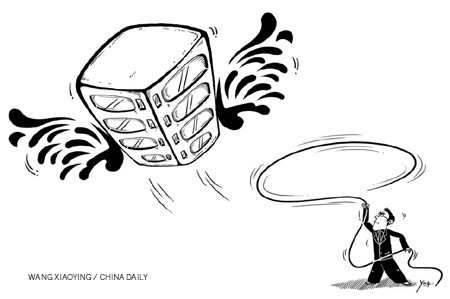Opinion
Falling prices need soft landing
By Grayson Clarke (China Daily)
Updated: 2010-10-13 14:50
 |
Large Medium Small |

Any doubts I had about a bubble in China's property market were dispelled during a recent visit to a third-tier city. The hundreds of half completed and completed but empty apartment blocks were matched by the number of desperate sellers who approached my colleagues and me.
The property bubble has to be deflated, and the government has recognized the importance of doing so. It has applied the brakes on the property market by raising the percentage of down payment needed and banning outright bank loans to people buying a third house.
The difficulty, however, is that such government actions risk either stalling the property market altogether, which could have serious consequences for the whole economy, or letting the market run away again by loosening the controls too early. What it needs to do is to find a way of decelerating the market through a change of gears. But the question is: Does it have the right levers to slow the market down?
One of the right levers is the introduction of a property tax. Just before the National Day holiday the government announced plans to accelerate the property tax pilot program to include Shanghai and Shenzhen. This is a very positive move, because property has for long been the component preferred to other assets in tax treatment. A well targeted property tax would help dampen speculation, increase the availability of the existing vacant housing for rent and, in the longer term, put local government finances on a more secure footing.
The government needs to take care of the demand side, too. A fall in prices seems inevitable, and given the extent to which the key price to average earnings ratio has risen beyond an affordable range this would not be a bad thing.
But large falls - of more than 20 percent - are likely to "spook" the market, creating a situation that could make people who bought property when prices were at their peak suffer huge negative equity. The government needs to support home ownership (but not financial speculation) and therefore it needs to buttress first-time homebuyers. This means it needs to ensure that the burden of the new property tax on first-time homebuyers is light. Furthermore, I believe that while the government is right in raising the percentage of down payment to buy a house and restricting loans for multiple purchases, it should reconsider its decision to increase the down-payment threshold for first-time buyers. It seems that banks have extended plenty of credit to property developers, but have been far less generous to potential first-time buyers.
Therefore, there is a good case for reducing the deposit to 15 percent for reasonable credit risks and for extending the period of mortgage loans. Lifting the veil from local governments' opaque housing loan schemes and creating proper individual accounts for employees' contributions could help people acquire the crucial first deposit.
Moreover, if prices start falling significantly there is also a case for banks to extend the mortgage repayment periods of people with good repayment records without imposing administrative or other financial penalties. The government must avoid a situation in which struggling homeowners "dump" more houses on the market and where potential buyers delay entering the market in the hope that prices will fall further.
A third option would be to look at partial equity schemes. This has been an option for lower-income as well as middle-income families buying houses in high-priced areas of the United Kingdom. Such people purchase a part share in the property and for the remainder pay rent. Usually, they do it in partnership with housing associations, which are nonprofit social housing developers.
In China, this could be done in partnership with private developers who, from their perspective, may be willing to do so to generate cash flow without too large a drop in prices.
Another element supporting demand at the high end of the market, would be to relax controls and encourage purchases by foreign companies seeking property for their expatriate staff. Such a scheme could prompt thousands of overseas Chinese to invest in the country's property market. This would not reduce but increase tax revenues.
The above measures, applied together could help stabilize the market without triggering another round of price inflation. They cannot be considered in isolation from supply measures. Lending to developers needs to be tightened further, and should first be directed toward projects that await completion and new development projects undertaken by companies which have sold nearly all their existing units.
But for these measures and the property tax to work an orderly property market is a must - and that means taking care of demand.
The author is an international consultant with the EU-China Social Security Reform Cooperation Project.



